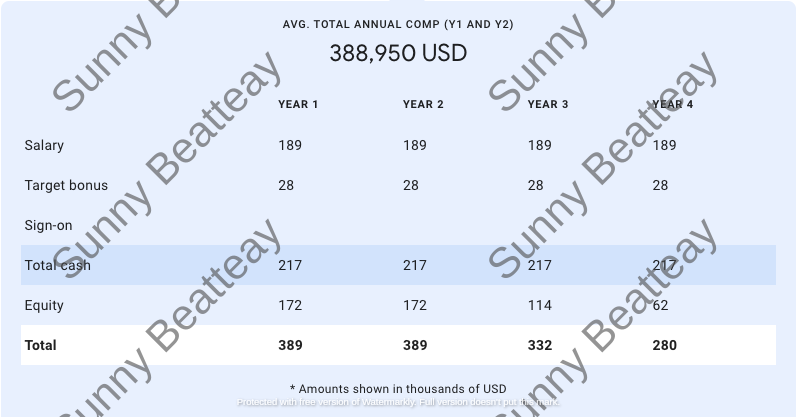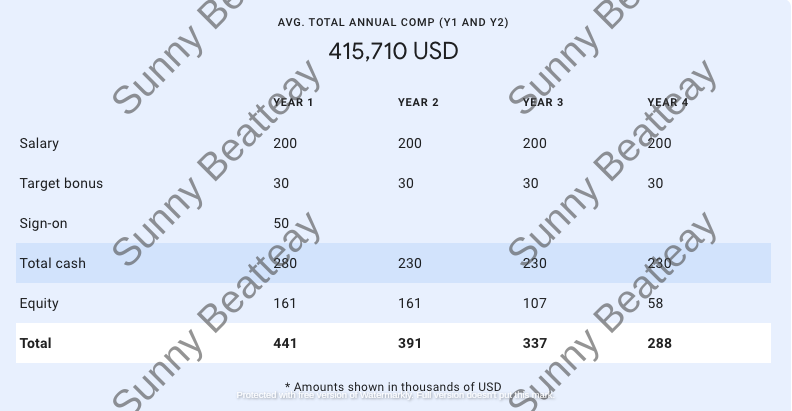I’ll be the first to admit that I’ve never been great at negotiating. During my first job search, I choked during negotiations. I’d rather solve the coin change problem 100 times in a row than ask a recruiter for more money.
So when it came time to do my most recent job hunt, I knew I had my work cut out for me. Especially since I was targeting FAANG and other brand-name tech companies, of these companies, I had a special focus on Google.
Of all the FAANG companies, Google is among the most prestigious, if not the most prestigious. It also has the hardest interviews. It’s no secret that you must be well-versed in algorithms, data structures, and system design. You also need a heaping scoop of luck.
But Google’s offers are as notorious as their interviews.
Google’s infamous for down-leveling prospective candidates. Many technical candidates that try to interview as senior software engineers don’t pass the senior bar. Instead, they receive mid-level offers.
Even if you manage to get the level you wanted, the compensation package won’t be competitive — at least not at first. Google has a compensation band for each level, and its initial offers are always at the lower end of the band. They’re also stubborn about negotiations.
But, with enough leverage and tricks of the trade, you can get top-of-band, and even out-of-band offers. I know this from experience as I negotiated a $100K increase in compensation for my Senior (L5) offer.
And this is how I did it.
The Interview
Before I get to the negotiation, I need to go over the interview first.
I interviewed with Google early in my job search as they move at a glacial pace. There are many phases before you get to an offer, and each one can last many weeks. The longest of which is the team match phase, which can last as short as 1–2 weeks or as long as six months.
Luckily, I was able to make a beeline through the process. This is because I got a referral from someone in the company. And due to my prior experience as a technical lead, I was able to skip the initial tech screen and go straight to the onsite interviews. Additionally, my team match phase only lasted two weeks.
But my experience was far from typical. So if you plan on interviewing with Google, I would suggest doing it sooner in your job search rather than later. Click here for the resources I used to prepare for FAANG interviews.
The First Offer
While Google was one of the first companies I interviewed with, I already had other pending offers by the time I got to the team match (as I said, they move slow).
In Google’s typical process, you don’t receive an offer until after you’ve gone through a team match. But with the other offers in hand, Google was willing to hurry its process. They moved me into the offer phase while I was still matching with teams. Within a couple of weeks of passing the onsite, an offer letter appeared in my inbox.
This was the offer that followed.

One thing to know about Google is that they have an unusual equity vesting schedule. For most companies, you receive a quarter of your equity grants each year over a four-year period.
But Google’s vesting schedule looks like this:
- Year 1: 33%
- Year 2: 33%
- Year 3: 22%
- Year 4: 12%
Their schedule is “frontloaded.” For the first two years, you receive one-third of your equity each year. After the second year, the equity drops off rapidly. The reason they do this is to avoid the “four-year cliff.” Google gives equity refreshers to make up for the drop. This is meant to incentivize people to stay at the company longer.
First Negotiations
As I mentioned before, Google’s first offer is at the lower end of the compensation band for your level. So there’s always room for negotiation.
At the same time, this was still a solid offer. It can be annoying and anxiety-inducing to try to negotiate. Many people take the first offer just so they can be done with interviewing. But a little patience can go a long way. If I was willing to wait and push for more, there was a high chance of success.
So I did.
The recruiter called to discuss the offer and my impressions of it. I cordially let them know that I had other competitive offers and told them my ideal compensation range.
Many people think that you need to reveal all your cards during negotiations — but that isn’t the case. I was careful not to say what my other offers were or reveal any other offer letters.
After letting the recruiter know my target compensation, they said they would see what they could do. But they couldn’t make any promises.
The Second Offer
I was uncertain whether Google would be able to increase their offer or not, as my interview performance wasn’t the greatest. Remember how I mentioned that Google tends to down-level candidates? Well, that happened to me.
I interviewed for a senior position, which entailed one behavioral, one system design, and three coding interviews. But I didn’t perform well on two of the coding rounds, so they only approved me for a mid-level (L4) position.
My recruiter gave me two choices:
1. Take the L4 level and move to the team match phase.
2. Do two extra coding interviews to see if I could pass the senior bar.
While it may seem obvious to go with option two, there’s a catch. If I performed even worse on the makeup interviews, I could get down-leveled again to junior engineer (L3). Or they could flat-out reject me. So there was risk involved. But I had my sights on that “senior” title, so I took the risk.
And it paid off! I performed much better on the follow-up interviews and got the green light for the senior level. But that didn’t bode well for my negotiations.
One of the best ways to have a successful negotiation is to interview well. The better you perform, the more the company will want you to join, and the more they will be willing to pay. This is why I was worried my temporary down-level would impact my ability to negotiate.
But my worries were put to rest two days later when I received an email with the updated offer.

At this point, the only pieces of information I had revealed to my recruiter were that I had other offers and my ideal compensation range. So this updated offer was a $60k increase simply because I asked for it.
Now, if I was only interviewing with Google or I was only interested in working at Google, I would’ve taken this offer. But I was interviewing with other great companies that I liked, so I held off on signing.
The recruiter said this was the highest offer the compensation team would approve, but I had my doubts about that. I still had one negotiation tactic up my sleeve. Although, this tactic required a really strong competing offer to pull off.
And luckily, I got one.
Second Negotiations
When Google gave me their second offer, they were one of my higher offers, but that wouldn’t last. Another company I was interviewing with ended up giving me an offer that was a generous 20% bump over Google.
With this new offer in hand, I went back to Google and asked if they could match. And this time, I showed them the offer letter, revealing the complete breakdown of the package. This was my way of laying out all my cards to the recruiter to show that I was serious about negotiating.
The recruiter reiterated that they weren’t sure they could increase the previous offer, but they would give it a shot.
I had no idea if Google would budge at all, but I was hopeful. And when I heard back that the new offer would need approval from the director, VP, and finance team, I knew I was in for something good.
The Final Offer
There’s always some degree of risk with an out-of-band offer. Since it requires approval from multiple people, there’s a chance it could get denied. So I waited with bated breath over the next couple of days, eager to hear if the offer would get approved.
And to my delight, I soon received an email detailing the breakdown of the newest offer.

Since this offer required VP approval, no further negotiations were possible. This was their best and final — for real this time.
This is, by far, the most I’ve ever negotiated an offer. With the signing bonus, this final offer marked a $110K increase in first-year compensation over the first offer. And it was an $85K increase when averaging over the first two years.
Lessons Learned
I always hear about the importance of negotiating when interviewing for jobs. “Negotiate negotiate negotiate” is the general advice, but it can be tough to practice at the moment. When you finally get to that stage, it can be all too easy to think, “well, how much am I really missing out on if I don’t negotiate?”
Take it from me; it’s a lot.
I know many people would have taken Google’s first offer without a thought. It’s to those people for whom I wrote this article. If I had accepted that initial offer, I would’ve lost out on $100K in the first year and ~$300K across all four years. That’s a lot of money, to say the least. For better or worse, negotiating is still a crucial part of the job search.
With all that said, here are some quick tips I learned during my job search:
- Do as much as of the negotiating over email instead of on the phone.
- Build a good rapport with your recruiter as they’re the ones that go to bat for you during negotiations.
- You need leverage to negotiate. The best pieces of leverage are competing for offers, a great interview performance, and the willingness to walk away. One of these is good, but having all three leads to amazing offers.
- You don’t need to reveal the values of the competing offers. Simply stating “I have competing offers, and I’m targeting this compensation range,” is good enough for many companies.
- But revealing the offer letters of competing offers can be a useful tool to show your seriousness.
- If companies are still stubborn about negotiating, even after the above suggestions, you can go with the all-or-nothing approach. “I will join if you can offer $X.” Only use this for companies you will actually join.
I would also recommend these articles by Haseeb Qureshi for more negotiation tips.
And remember: a company’s “best offer” is rarely their best. If they want you enough, they’ll find the money.
Thanks to Anupam Chugh

